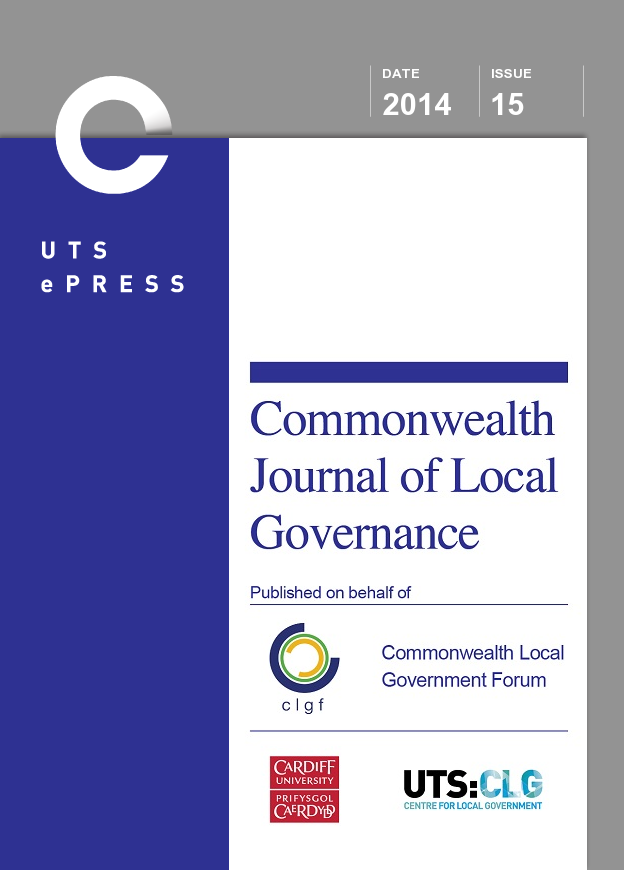Does local government have capacity for enabling local economic development? Lessons from Jamaica
Main Article Content
Abstract
Implementation of the Caribbean Local Economic Development Project (CARILED)1began in 2012 in seven countries for a duration of six years, to support sustainable economic growth in the region. CARILED has introduced the idea of local economic development (LED) to the ‘development’ debate in the region but has also brought the organisational capacity of local government, and local government’s role as ‘facilitator’ of LED,to the fore. This paper assesses organizational behaviour and capability in local government in Jamaica to determine the state of readiness for a developmental role. The paper draws on two sets of research data to aid its analysis–a capacity audit (CAPAUD) conducted in 2010 and an organisational analysis (OA)commissioned by the Ministry of Local Government in 2010, both of which targeted a sample of local authorities in Jamaica.
The study found that when assessed against established criteria for an LED organisation, ie: research and information provision; marketing and coordination; learning and innovation; and leadership - local government’s institutional and organisational capacity for development is unevenly distributed. For instance, local leaders understood organisational purpose but efforts to give effect to this appeared undeveloped, sporadic and uni-directional. It was also evident that participatory strategies are used to gain information from communities but these were often devoid of systematic research methodologies rendering formal community impact on local planning negligent. Finally there is strong potential for the kind of administrative leadership required by a developmental local government to evolve,indicated by the quality of training, quantum of managerial/supervisory staff, and stability of staff establishment. However, this potential is threatened by the deficiencies in the non-traditional functional areas that are strategic to the organisation’s effectiveness as a ‘facilitator’ of LED, ie:alignment of community engagement/interface with LED priorities, diffusion of information technology in organisational processes, and utilisation of policy analysis and development. These findings contribute important policy relevant information to the discourses in the region about the construction of alternative solutions to institutional and organisational problems in response to the economic crises of small island developing states (SIDS).
Article Details
Issue
Section
Authors who submit articles to this journal from 31st March 2014 for publication, agree to the following terms:
a) Authors retain copyright and grant the journal right of first publication with the work simultaneously licensed under a Creative Commons Attribution License that allows others to share and adapt the work with an acknowledgement of the work's authorship and initial publication in this journal.
b) Authors are able to enter into separate, additional contractual arrangements for the non-exclusive distribution of the journal's published version of the work (e.g., post it to an institutional repository or publish it in a book), with an acknowledgement of its initial publication in this journal.
c) Authors are permitted and encouraged to post their work online (e.g., in institutional repositories or on their website) prior to and during the submission process, as it can lead to productive exchanges, as well as earlier and greater citation of published work (See The Open Access Citation Advantage Service). Where authors include such a work in an institutional repository or on their website (ie. a copy of a work which has been published in a UTS ePRESS journal, or a pre-print or post-print version of that work), we request that they include a statement that acknowledges the UTS ePRESS publication including the name of the journal, the volume number and a web-link to the journal item.
d) Authors should be aware that the Creative Commons Attribution (CC-BY) License permits readers to share (copy and redistribute the work in any medium or format) and adapt (remix, transform, and build upon the work) for any purpose, even commercially, provided they also give appropriate credit to the work, provide a link to the license, and indicate if changes were made. They may do these things in any reasonable manner, but not in any way that suggests you or your publisher endorses their use.
For Issue 13/14, and all issues before, the following copyright applied:
Authors submitting a paper to UTS ePRESS publications agree to assign a limited license to UTS ePRESS if and when the manuscript is accepted for publication. This license allows UTS ePRESS to publish a manuscript in a given issue. Articles published by UTS ePRESS are protected by copyright which is retained by the authors who assert their moral rights. Authors control translation and reproduction rights to their works published by UTS ePRESS. UTS ePRESS publications are copyright and all rights are reserved worldwide. Downloads of specific portions of them are permitted for personal use only, not for commercial use or resale. Permissions to reprint or use any materials should be directed to UTS ePRESS via the journal's main editor, Alison Brown, journal@clgf.org.uk
